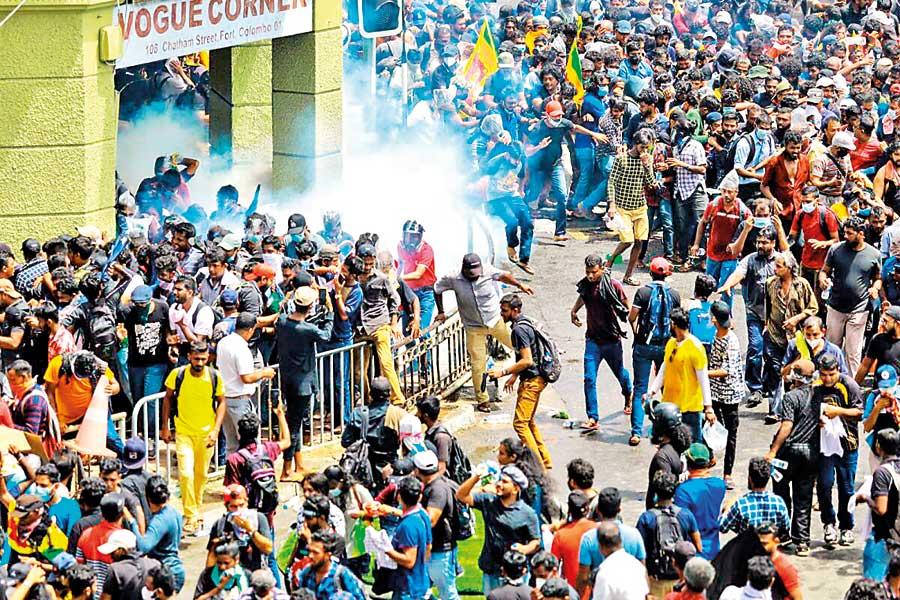09 Jan 2023 - {{hitsCtrl.values.hits}}

System change was one of the important matters the protesters (aragalists) wanted to emphasize during the widespread anti-government uprising last year.
The Chairman of the National Elections Commission has stated that arrangements are already in place to conduct the LG Election by end of March 2023— that’s his job. He has also mentioned that Election would cost the tax-payer Rs. 12 billion— not his concern. While the President, who absolved himself of election propaganda, spoke of the indecision of Election Commission members on holding the LG Election and he requested a divided Commission to come to a unanimous decision.
mentioned that Election would cost the tax-payer Rs. 12 billion— not his concern. While the President, who absolved himself of election propaganda, spoke of the indecision of Election Commission members on holding the LG Election and he requested a divided Commission to come to a unanimous decision.
History of LG
Local government has been defined in various ways, but perhaps the simplest definition is “The management of their own affairs by the people of a locality”. A study of the present system of local government is significantly facilitated by a knowledge of the development of local government from the earliest times. Lord Ripon, during his tenure as the Viceroy, initiated many reforms including the introduction of local self-government, the first of its kind in British India. According to the Mahavamsa there were village based human settlements that Sinhalese kings used as independently administered units of administration [dating to the 4th century BC]. Although most of the local authorities in existence today are of comparatively recent origin, and their constitution, powers, and duties were laid down by modern statutes, the structure of local government is still based largely on areas of administration that existed in Saxon and Norman times in Britain that spans back into the history of Anglo-Saxon England (c. 700-1066). Some of the functions for which local authorities are now responsible were exercised in an elementary form in the middle Ages. However, the foundation period of modern local government was at the beginning of the 19th century.
Evolution of LG Legislation in Sri Lanka
Colombo Municipal Council Established in 1865, is one of the oldest in South Asia. The Local Government Enactment No. 11 of 1920, passed by the Legislative Council under British rule formed three types of local authorities: they were Urban District Councils, Rural District Councils, and General Councils. They were mostly appointed, but the new authorities were elected. Two Urban District Councils were created in 1922 and an additional six in 1923. The concept and certain aspects of its modern system are directly resulting from this time; particularly the pattern that towns and villages should be administrated separately.
Today, Local authorities are divided into three different groups: municipal councils, urban councils, and pradeshiya sabhas. There are 341 local authorities, including 24 municipal councils; 41 urban councils, and 276 Pradeshiya sabhas. All local authorities are elected using the mixed electoral system.
"Politicians are suffering from Greed for money and power, it is an incurable disease. Out of the non-corrupt, we need to choose honest, clever, educated, decent men with a passion to build this nation’s prosperity"
In the constitution of Sri Lanka, only the concept of a “Local Authority” has been included; no mention of local government, until certain provisions were introduced under the 13th amendment to the constitution where LG is listed as a subject for the provincial councils. All matters relating to local government, [apart from its structure, form, and constitution], have been entrusted to provincial councils. The provincial councils supervise the local authorities and guide and assist as required within the constitutional safeguards and policy guidelines. As at present, the structure of LG is coming under the purview of the central government. Local authorities are governed by the Urban Councils Ordinance of 1939, the Municipal Councils Ordinance of 1947, and the Pradeshiya Sabhas Act of 1988, as well as the constitution. In 2012, The PR system for local authorities was abolished with the passing of the LG Election Amendment Bill and the Special Provisions Bill.
The following six amendment Acts were passed in 2016/17: Local Authorities Elections (Amendment) Act (No. 31 of 2017): Local Authorities Filling of Vacancies (Special Provisions) (Amendment) Acts (Nos. 34, 35, 36 and 37 of2014): Municipal Council (Amendment) Act (No. 34 of 2014): Urban Council (Amendment) Act (No. 35 of 2014): Pradeshiya Sabha (Amendment) Act (No. 36 of 2014). The amendment act, No. 1 of 2016 introduced the mixed electoral system for the Local Government bodies and made another Amendment to make 60% First-Past-the-Post representation and 40 percent Proportional Representation.
Elections for Whose Benefit?
At a time when the people are in great difficulty struggling to overcome the worst economic destruction in History, it is absurd and a crime to rush for a worthless, costly Mini-Election, presumably allowing for another group of power-hungry, corrupt and self-seeking political cronies four more years under the pretext of complying with Democracy.
An LG election is not a priority at this challenging stage. They expect remedies to the burning problems that disturb the lives of their children. They demand short and long-term economic retrieval and restructuring of debt with funding agencies. A strong national and legislative accord among all Parties in the Parliament; a system change beginning with a superior electoral procedure leading to a healthy representative democracy under a new constitution that scraps Executive Presidency are the priorities of the hour.
For radical ‘system changes’ to occur, it is crucial for setting up an ‘All-Party Interim Government’ totally dedicated to taking the country from its current predicament and bringing about reconciliation and success as envisaged by the Aragalayists. Five decades ago, there were no Pradeshiya Sabhas run by mainstream political parties: instead, a respected independent representative elected by the inhabitants of each village formed the Village Council. The re-introduction of such a programme certainly would lead to the de-politicization of local government elections. First, we have to abandon unrewarding LG elections under the existing system and proceed to achieve more fruitful objectives through proposed ‘Jana-sabhas’.
Politicians are suffering from Greed for money and power, it is an incurable disease. Out of the non-corrupt, we need to choose honest, clever, educated, decent men with a passion to build this nation’s prosperity. All prevailing differences between the main parties should be resolved with this objective. Only the finest and most accountable politicians can protect the country. We need to have some honest, trustworthy; reliable, and educated men and women in politics.
Jana-Sabhas & Grama Rajya
‘Jana-sabhas’ in parallel with the ‘Grama Rajya’ concept as proposed by the National Movement of Social Justice, is a very sensible and judicious suggestion leading to the de-politicization of the Local Government machinery. This scheme should receive a favourable response from every patriotic political leader, albeit the power-hungry and self-interested political groups waiting for an opportunity to test their strengths and compare with rival politically expedient groups who boast of “broad alliances”. Either postpone elections by one year, until the new system is legalized or dissolve all councils and bring them under Commissioners. An election would further divide the politically inclined Community. The 12 billion could be diverted to cure malnutrition in children in the worst affected sections of the poorest of the poor.
The ‘pohottuva’ scoundrels who are eager to throw part of the loot and win back a few authorities and continue their stealing, as well as the self-interested political jokers of the main opposition and the former Rajapaksa cronies and clowns who make a clarion call for elections, should comprehend that only a serious ‘System change’ could prevent a recurrence of another massive people’s struggle led by the independent youth and supported by the masses!
09 Jan 2025 2 hours ago
09 Jan 2025 2 hours ago
09 Jan 2025 2 hours ago
09 Jan 2025 2 hours ago
09 Jan 2025 3 hours ago